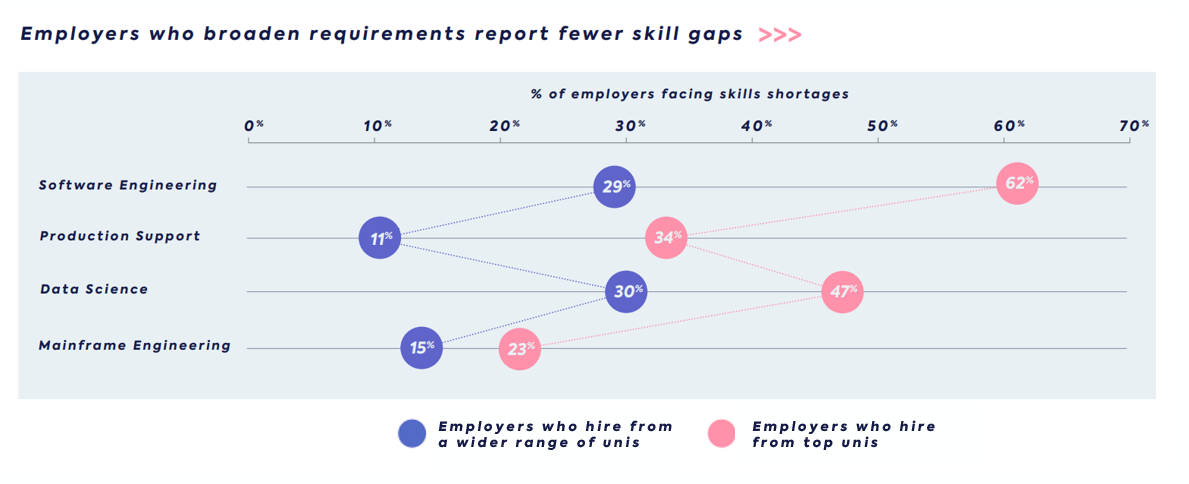Skill shortages and a lack of diversity continue to challenge leaders in tech.
Chapter 4 of mthree's latest Diversity in Tech report highlights how organisations can help bridge these gaps by rethinking hiring practices and expanding requirements.

~ 4min read
Skill shortages and a lack of diversity continue to challenge leaders in tech.
Chapter 4 of mthree's latest Diversity in Tech report highlights how organisations can help bridge these gaps by rethinking hiring practices and expanding requirements.
According to the report, 42% of employers plan to reduce degree requirements for tech roles in the coming year. This shift allows organisations to tap into previously overlooked talent pools, broadening opportunities for individuals who may not have followed conventional academic pathways.
Data from the report shows that broadening candidate requirements benefits businesses in two key areas:
1. Tech skills: Employers hiring from a broader range of universities report fewer skill shortages. This is especially true in fields like software engineering, production support, data science, and mainframe engineering.

2. Diversity: The percentage of businesses requiring a bachelor’s degree fell by 10% from 2023 to 2024. Over a third (35%) of organisations that eased these degree requirements cited diversity as a primary motivation:
By prioritising skills and potential over traditional indicators of quality like degrees, companies are tapping into new pools of talent. Inclusive hiring drives innovation and sets businesses up for long-term success.
If you are a leader aiming to improve diversity while building skilled teams, here are practical steps you can take:
The benefits of diverse recruitment extend far beyond solving immediate skill shortages. A more inclusive workforce encourages creativity and drives innovation. It also better represents the diverse customers that many tech companies serve. Additionally, the report highlights that organisations embracing flexible hiring practices report higher resilience and adaptability in their teams.
By looking beyond traditional education and focusing on practical skills and potential, tech leaders can find hidden talent. This approach helps create a more dynamic and future-ready workforce.
Expanding recruitment pathways is not just about meeting today’s workforce needs. It’s about laying the groundwork for a more inclusive, innovative, and resilient tech industry. As technology continues to evolve, so must our approach to finding and nurturing talent.
For leaders, the message is clear. Embrace diverse recruitment strategies, prioritise adaptability and skills over rigid qualifications, and commit to creating opportunities for underrepresented groups. By doing so, you can drive meaningful change and secure the future success of your organisation.
mthree helps organisations address skill gaps and build diverse teams by focusing on practical training and inclusive talent pipelines.
Through our hire train deploy programme, we train and deploy diverse talent, including graduates, school leavers, and career changers, who bring fresh skills and perspectives. These individuals join your team for 12–24 months, with the majority transitioning to permanent roles.
For immediate needs, our Expert programme provides seasoned professionals who integrate seamlessly into your projects while reducing hiring risks.
Our Reskill programme helps upskill your existing workforce, preparing them for high-demand roles like AI development or IT support. This approach ensures your teams stay future-ready.
At mthree, we align with your diversity and innovation goals by broadening talent pools, reducing bias, and building teams ready for tomorrow’s challenges. With mthree, you’re investing in a skilled, inclusive, and future-proof workforce.
Ready to future-proof your workforce? Contact mthree today to start building diverse, innovative teams equipped for tomorrow's challenges.